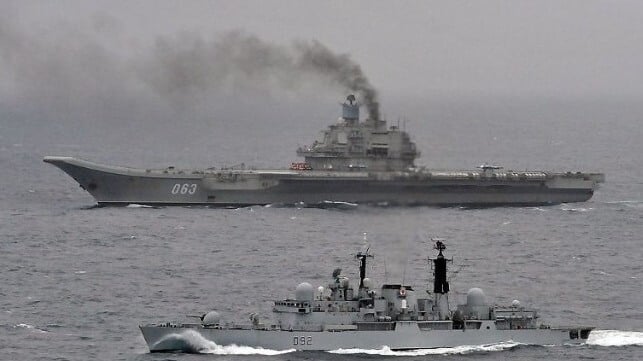Russia's Sole Aircraft Carrier Catches Fire Again

The Russian Navy's sole aircraft carrier, the Admiral Kuznetsov, caught fire again in an incident small enough to cause "no damage" yet large enough to prompt a report in Russia's flagship state media outlet.
The head of state shipbuilder USC, Alexei Rakhmanov, told RIA Novosti that a small fire broke out aboard Kuznetsov during repairs. No injuries or damage were reported, and the work on the vessel continues.
The carrier Kuznetsov is the Russian Navy's flagship, and her midlife overhaul has been under way since her return from the Syrian conflict in 2017. She is getting a new set of boilers, among other major repairs, and the work has not gone smoothly. In October 2018, while she was up on blocks aboard the floating drydock PD-50, the dock sank out from under her. A 70-tonne crane toppled from the drydock's wing wall onto Kuznetsov's deck, leaving a hole measuring four to five meters across. Luckily for the Russian Navy, a response team succesfully floated and removed the Kuznetsov from the drydock during the dock's sinking. One shipyard worker went missing and four were injured in the accident.
After the dock sank, Kuznetsov was transferred to the 35th Shipyard and moored while awaiting other options. (The lost PD-50 was the only asset in Russia capable of handling a docking for a vessel of her size.) Topside repairs continued, and so did the accidents. In December 2019, welding sparks ignited spilled fuel in one of her holds; two people were killed and over a dozen were injured.
Kuznetsov was finally transferred to a newly-enlarged graving dock at the 35th Shipyard in May 2022, and USC says that repairs should be completed at last in 2024, approximately four years behind schedule.
Analysts are divided over Kuznetsov's usefulness in combat. Her jump-ramp takeoff system limits fighter-bombers to a light weapons load and a smaller quantity of fuel than they would be able to carry if launched by steam catapult, restricting their range and their fighting capability. During her last campaign off Syria, she lost two fighters in 400 sorties due to arresting-gear failures.
